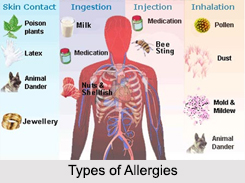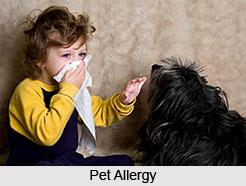 Types of Allergies are numerous which includes the Respiratory allergy, Insect sting allergy, Food allergy, Contact allergy, etc. An allergy occurs when the immune system of the body sees a certain substance as harmful. It reacts by causing an allergic reaction. The substances that cause allergic reactions are `Allergens`. The types of allergies help one to understand and differentiate the diversity of allergies and thus select the appropriate method of treatment.
Types of Allergies are numerous which includes the Respiratory allergy, Insect sting allergy, Food allergy, Contact allergy, etc. An allergy occurs when the immune system of the body sees a certain substance as harmful. It reacts by causing an allergic reaction. The substances that cause allergic reactions are `Allergens`. The types of allergies help one to understand and differentiate the diversity of allergies and thus select the appropriate method of treatment.
Allergies exist in many different forms. Some allergies are seasonal and others are year-round. Some allergies may be life-long. These symptoms include nasal congestion, sneezing, runny nose, itchy nose, and itchy, watery eyes. The different types of Allergies are discussed below:
Respiratory Allergy: Respiratory allergies occur when the immune system has a negative reaction to some sort of airborne substance such as dust.
Insect Sting Allergy: Stings from insects like honeybees, hornets, wasps, yellow jackets and fire ants are known to cause allergic reactions to the venom injected into the skin.
Food Allergy: There are different types of allergic reactions to foods. There are differences between IgE-mediated allergies, non-IgE mediated allergies and food intolerances.
Contact Allergy: Contact Allergies occurs when skin touches something that a person is sensitive or allergic to, such as poison ivy, perfume, or a cleaning product. The skin becomes red, itchy, or swollen.
Drug Allergy: Drugs Allergies occur in only a small number of people. Most drug reactions are not allergic, but are side effects of the properties of the medicine. Sometimes skin testing for drug allergy is also done.
 Latex Allergy: A latex allergy is an allergic reaction to natural rubber latex. Rubber gloves, balloons and other natural rubber products contain latex. An allergy to latex can be a serious health risk.
Latex Allergy: A latex allergy is an allergic reaction to natural rubber latex. Rubber gloves, balloons and other natural rubber products contain latex. An allergy to latex can be a serious health risk.
Mold Allergy: Mold and mildew are fungi. Since fungi grow in so many places, both indoors and outdoors, allergic reactions can occur year round.
Pet Allergy: Allergies to pets with fur are common. The fur of cats and dogs triggers pet allergies and the major pet allergens are actually proteins in the saliva of animals.
Pollen Allergy: Pollen is one of the most common triggers of seasonal allergies. Pollen allergies can trigger allergic reactions, which affect the sinus and respiratory tract of those with this allergy.
These types are further categorised into many more forms like cigarette smoke allergy, cockroach allergy, dust mite allergy, grass pollen allergy, hay fever, house dust allergy and many more.




















